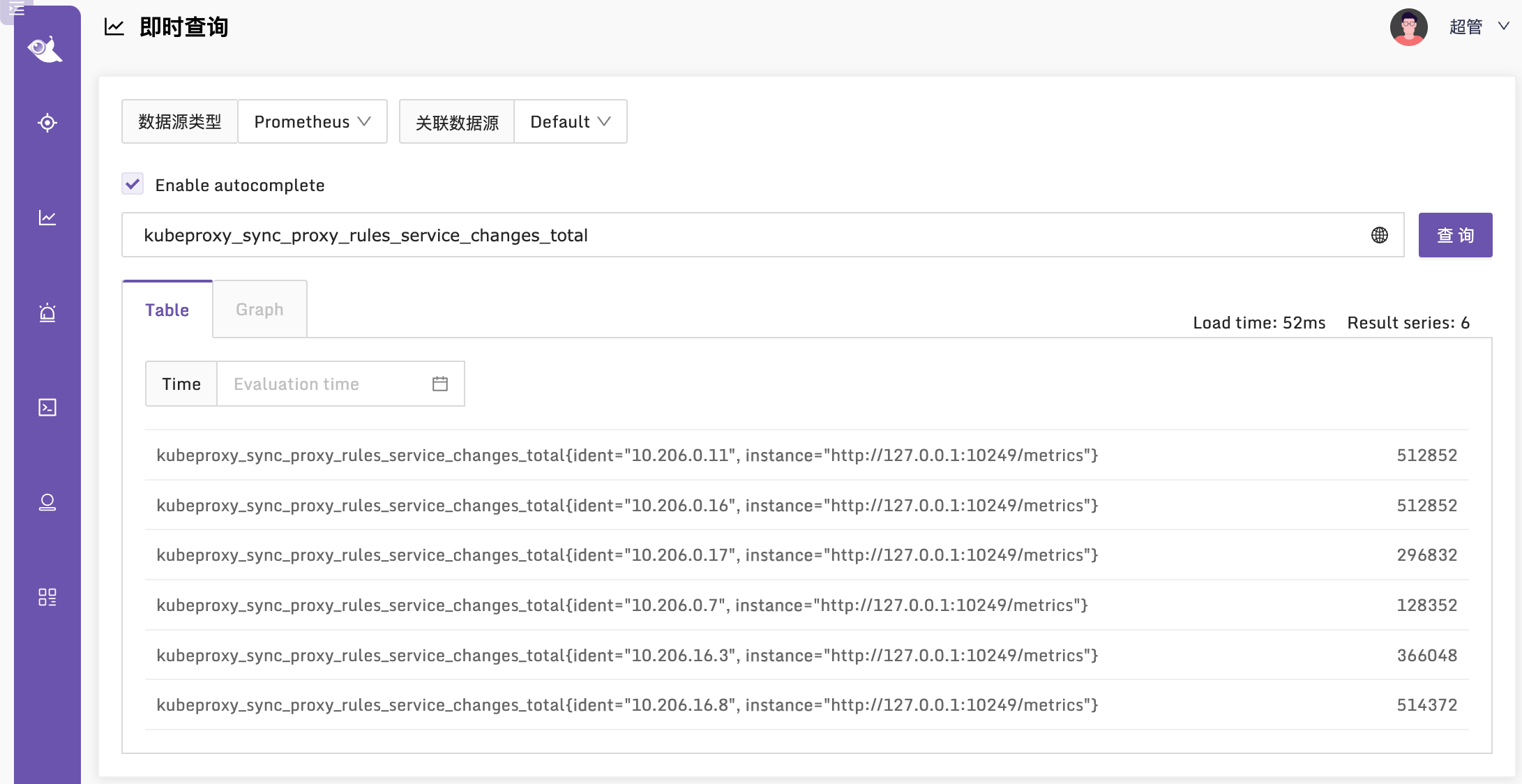Kubernetes监控手册04-监控Kube-Proxy
简介
首先,请阅读文章《Kubernetes监控手册01-体系介绍》,回顾一下 Kubernetes 架构,Kube-Proxy 是在所有工作负载节点上的。
Kube-Proxy 默认暴露两个端口,10249用于暴露监控指标,在 /metrics 接口吐出 Prometheus 协议的监控数据:
[root@tt-fc-dev01.nj lib]# curl -s http://localhost:10249/metrics | head -n 10
# HELP apiserver_audit_event_total [ALPHA] Counter of audit events generated and sent to the audit backend.
# TYPE apiserver_audit_event_total counter
apiserver_audit_event_total 0
# HELP apiserver_audit_requests_rejected_total [ALPHA] Counter of apiserver requests rejected due to an error in audit logging backend.
# TYPE apiserver_audit_requests_rejected_total counter
apiserver_audit_requests_rejected_total 0
# HELP go_gc_duration_seconds A summary of the pause duration of garbage collection cycles.
# TYPE go_gc_duration_seconds summary
go_gc_duration_seconds{quantile="0"} 2.5307e-05
go_gc_duration_seconds{quantile="0.25"} 2.8884e-05
10256 端口作为健康检查的端口,使用 /healthz 接口做健康检查,请求之后返回两个时间信息:
[root@tt-fc-dev01.nj lib]# curl -s http://localhost:10256/healthz | jq .
{
"lastUpdated": "2022-11-09 13:14:35.621317865 +0800 CST m=+4802354.950616250",
"currentTime": "2022-11-09 13:14:35.621317865 +0800 CST m=+4802354.950616250"
}
所以,我们只要从 http://localhost:10249/metrics 采集监控数据即可。既然是 Prometheus 协议的数据,使用 Categraf 的 input.prometheus 来搞定即可。
Categraf prometheus 插件
配置文件在 conf/input.prometheus/prometheus.toml,把 Kube-Proxy 的地址配置进来即可:
interval = 15
[[instances]]
urls = [
"http://localhost:10249/metrics"
]
labels = { job="kube-proxy" }
urls 字段配置 endpoint 列表,即所有提供 metrics 数据的接口,我们使用下面的命令做个测试:
[work@tt-fc-dev01.nj categraf]$ ./categraf --test --inputs prometheus | grep kubeproxy_sync_proxy_rules
2022/11/09 13:30:17 main.go:110: I! runner.binarydir: /home/work/go/src/categraf
2022/11/09 13:30:17 main.go:111: I! runner.hostname: tt-fc-dev01.nj
2022/11/09 13:30:17 main.go:112: I! runner.fd_limits: (soft=655360, hard=655360)
2022/11/09 13:30:17 main.go:113: I! runner.vm_limits: (soft=unlimited, hard=unlimited)
2022/11/09 13:30:17 config.go:33: I! tracing disabled
2022/11/09 13:30:17 provider.go:63: I! use input provider: [local]
2022/11/09 13:30:17 agent.go:87: I! agent starting
2022/11/09 13:30:17 metrics_agent.go:93: I! input: local.prometheus started
2022/11/09 13:30:17 prometheus_scrape.go:14: I! prometheus scraping disabled!
2022/11/09 13:30:17 agent.go:98: I! agent started
13:30:17 kubeproxy_sync_proxy_rules_endpoint_changes_pending agent_hostname=tt-fc-dev01.nj instance=http://localhost:10249/metrics 0
13:30:17 kubeproxy_sync_proxy_rules_duration_seconds_count agent_hostname=tt-fc-dev01.nj instance=http://localhost:10249/metrics 319786
13:30:17 kubeproxy_sync_proxy_rules_duration_seconds_sum agent_hostname=tt-fc-dev01.nj instance=http://localhost:10249/metrics 17652.749911909214
13:30:17 kubeproxy_sync_proxy_rules_duration_seconds_bucket agent_hostname=tt-fc-dev01.nj instance=http://localhost:10249/metrics le=+Inf 319786
13:30:17 kubeproxy_sync_proxy_rules_duration_seconds_bucket agent_hostname=tt-fc-dev01.nj instance=http://localhost:10249/metrics le=0.001 0
13:30:17 kubeproxy_sync_proxy_rules_duration_seconds_bucket agent_hostname=tt-fc-dev01.nj instance=http://localhost:10249/metrics le=0.002 0
13:30:17 kubeproxy_sync_proxy_rules_duration_seconds_bucket agent_hostname=tt-fc-dev01.nj instance=http://localhost:10249/metrics le=0.004 0
13:30:17 kubeproxy_sync_proxy_rules_duration_seconds_bucket agent_hostname=tt-fc-dev01.nj instance=http://localhost:10249/metrics le=0.008 0
13:30:17 kubeproxy_sync_proxy_rules_duration_seconds_bucket agent_hostname=tt-fc-dev01.nj instance=http://localhost:10249/metrics le=0.016 0
13:30:17 kubeproxy_sync_proxy_rules_duration_seconds_bucket agent_hostname=tt-fc-dev01.nj instance=http://localhost:10249/metrics le=0.032 0
13:30:17 kubeproxy_sync_proxy_rules_duration_seconds_bucket agent_hostname=tt-fc-dev01.nj instance=http://localhost:10249/metrics le=0.064 274815
13:30:17 kubeproxy_sync_proxy_rules_duration_seconds_bucket agent_hostname=tt-fc-dev01.nj instance=http://localhost:10249/metrics le=0.128 316616
13:30:17 kubeproxy_sync_proxy_rules_duration_seconds_bucket agent_hostname=tt-fc-dev01.nj instance=http://localhost:10249/metrics le=0.256 319525
13:30:17 kubeproxy_sync_proxy_rules_duration_seconds_bucket agent_hostname=tt-fc-dev01.nj instance=http://localhost:10249/metrics le=0.512 319776
13:30:17 kubeproxy_sync_proxy_rules_duration_seconds_bucket agent_hostname=tt-fc-dev01.nj instance=http://localhost:10249/metrics le=1.024 319784
13:30:17 kubeproxy_sync_proxy_rules_duration_seconds_bucket agent_hostname=tt-fc-dev01.nj instance=http://localhost:10249/metrics le=2.048 319784
13:30:17 kubeproxy_sync_proxy_rules_duration_seconds_bucket agent_hostname=tt-fc-dev01.nj instance=http://localhost:10249/metrics le=4.096 319784
13:30:17 kubeproxy_sync_proxy_rules_duration_seconds_bucket agent_hostname=tt-fc-dev01.nj instance=http://localhost:10249/metrics le=8.192 319784
13:30:17 kubeproxy_sync_proxy_rules_duration_seconds_bucket agent_hostname=tt-fc-dev01.nj instance=http://localhost:10249/metrics le=16.384 319786
13:30:17 kubeproxy_sync_proxy_rules_service_changes_pending agent_hostname=tt-fc-dev01.nj instance=http://localhost:10249/metrics 0
13:30:17 kubeproxy_sync_proxy_rules_last_queued_timestamp_seconds agent_hostname=tt-fc-dev01.nj instance=http://localhost:10249/metrics 1.6668536394083393e+09
13:30:17 kubeproxy_sync_proxy_rules_iptables_restore_failures_total agent_hostname=tt-fc-dev01.nj instance=http://localhost:10249/metrics 0
13:30:17 kubeproxy_sync_proxy_rules_endpoint_changes_total agent_hostname=tt-fc-dev01.nj instance=http://localhost:10249/metrics 219139
13:30:17 kubeproxy_sync_proxy_rules_last_timestamp_seconds agent_hostname=tt-fc-dev01.nj instance=http://localhost:10249/metrics 1.6679718066295934e+09
13:30:17 kubeproxy_sync_proxy_rules_service_changes_total agent_hostname=tt-fc-dev01.nj instance=http://localhost:10249/metrics 512372
Kube-Proxy 在 Kubernetes 架构中,负责从 APIServer 同步规则,然后修改 iptables 或 ipvs 配置,同步规则相关的指标就非常关键了,这里我就 grep 了这些指标作为样例。
通过 --test 看到输出了,就说明正常采集到数据了,你有几个工作负载节点,就分别去修改 Categraf 的配置即可。当然,这样做非常直观,只是略麻烦,如果未来扩容新的 Node 节点,也要去修改 Categraf 的采集配置,把 Kube-Proxy 这个 /metrics 地址给加上,如果你是用脚本批量跑的,倒是还可以,如果是手工部署就略麻烦。我们可以把 Categraf 采集器做成 Daemonset,这样就不用担心扩容的问题了,Daemonset 会被自动调度到所有 Node 节点。
Categraf 作为 Daemonset 部署
Categraf 作为 Daemonset 运行,首先要创建一个 namespace,然后相关的 ConfigMap、Daemonset 等都归属这个 namespace。只是监控 Kube-Proxy 的话,Categraf 的配置就只需要主配置 config.toml 和 prometheus.toml,下面我们就实操演示一下。
创建 namespace
[work@tt-fc-dev01.nj categraf]$ kubectl create namespace flashcat
namespace/flashcat created
[work@tt-fc-dev01.nj categraf]$ kubectl get ns | grep flashcat
flashcat Active 29s
创建 ConfigMap
ConfigMap 是用于放置 config.toml 和 prometheus.toml 的内容,我把 yaml 文件也给你准备好了,请保存为 categraf-configmap-v1.yaml
---
kind: ConfigMap
metadata:
name: categraf-config
apiVersion: v1
data:
config.toml: |
[global]
hostname = "$HOSTNAME"
interval = 15
providers = ["local"]
[writer_opt]
batch = 2000
chan_size = 10000
[[writers]]
url = "http://10.206.0.16:19000/prometheus/v1/write"
timeout = 5000
dial_timeout = 2500
max_idle_conns_per_host = 100
---
kind: ConfigMap
metadata:
name: categraf-input-prometheus
apiVersion: v1
data:
prometheus.toml: |
[[instances]]
urls = ["http://127.0.0.1:10249/metrics"]
labels = { job="kube-proxy" }
上面的 10.206.0.16:19000 只是举个例子,请改成你自己的 n9e-server 的地址。当然,如果不想把监控数据推给 Nightingale 也OK,写成其他的时序库(支持 remote write 协议的接口)也可以。hostname = "$HOSTNAME" 这个配置用了 $ 符号,后面创建 Daemonset 的时候会把 HOSTNAME 这个环境变量注入,让 Categraf 自动拿到。
下面我们把 ConfigMap 创建出来:
[work@tt-fc-dev01.nj yamls]$ kubectl apply -f categraf-configmap-v1.yaml -n flashcat
configmap/categraf-config created
configmap/categraf-input-prometheus created
[work@tt-fc-dev01.nj yamls]$ kubectl get configmap -n flashcat
NAME DATA AGE
categraf-config 1 19s
categraf-input-prometheus 1 19s
kube-root-ca.crt 1 22m
创建 Daemonset
配置文件准备好了,开始创建 Daemonset,注意把 HOSTNAME 环境变量注入进去,yaml 文件如下,你可以保存为 categraf-daemonset-v1.yaml:
apiVersion: apps/v1
kind: DaemonSet
metadata:
labels:
app: categraf-daemonset
name: categraf-daemonset
spec:
selector:
matchLabels:
app: categraf-daemonset
template:
metadata:
labels:
app: categraf-daemonset
spec:
containers:
- env:
- name: TZ
value: Asia/Shanghai
- name: HOSTNAME
valueFrom:
fieldRef:
apiVersion: v1
fieldPath: spec.nodeName
- name: HOSTIP
valueFrom:
fieldRef:
apiVersion: v1
fieldPath: status.hostIP
image: flashcatcloud/categraf:v0.2.18
imagePullPolicy: IfNotPresent
name: categraf
volumeMounts:
- mountPath: /etc/categraf/conf
name: categraf-config
- mountPath: /etc/categraf/conf/input.prometheus
name: categraf-input-prometheus
hostNetwork: true
restartPolicy: Always
tolerations:
- effect: NoSchedule
operator: Exists
volumes:
- configMap:
name: categraf-config
name: categraf-config
- configMap:
name: categraf-input-prometheus
name: categraf-input-prometheus
apply 一下这个 Daemonset 文件:
[work@tt-fc-dev01.nj yamls]$ kubectl apply -f categraf-daemonset-v1.yaml -n flashcat
daemonset.apps/categraf-daemonset created
[work@tt-fc-dev01.nj yamls]$ kubectl get ds -o wide -n flashcat
NAME DESIRED CURRENT READY UP-TO-DATE AVAILABLE NODE SELECTOR AGE CONTAINERS IMAGES SELECTOR
categraf-daemonset 6 6 6 6 6 <none> 2m20s categraf flashcatcloud/categraf:v0.2.17 app=categraf-daemonset
[work@tt-fc-dev01.nj yamls]$ kubectl get pods -o wide -n flashcat
NAME READY STATUS RESTARTS AGE IP NODE NOMINATED NODE READINESS GATES
categraf-daemonset-4qlt9 1/1 Running 0 2m10s 10.206.0.7 10.206.0.7 <none> <none>
categraf-daemonset-s9bk2 1/1 Running 0 2m10s 10.206.0.11 10.206.0.11 <none> <none>
categraf-daemonset-w77lt 1/1 Running 0 2m10s 10.206.16.3 10.206.16.3 <none> <none>
categraf-daemonset-xgwf5 1/1 Running 0 2m10s 10.206.0.16 10.206.0.16 <none> <none>
categraf-daemonset-z9rk5 1/1 Running 0 2m10s 10.206.16.8 10.206.16.8 <none> <none>
categraf-daemonset-zdp8v 1/1 Running 0 2m10s 10.206.0.17 10.206.0.17 <none> <none>
看起来一切正常,我们去 Nightingale 查一下相关监控指标,看看有了没有:

监控指标说明
Kube-Proxy 的指标,孔飞老师之前整理过,我也给挪到这个章节,供大家参考:
# HELP go_gc_duration_seconds A summary of the pause duration of garbage collection cycles.
# TYPE go_gc_duration_seconds summary
gc时间
# HELP go_goroutines Number of goroutines that currently exist.
# TYPE go_goroutines gauge
goroutine数量
# HELP go_threads Number of OS threads created.
# TYPE go_threads gauge
线程数量
# HELP kubeproxy_network_programming_duration_seconds [ALPHA] In Cluster Network Programming Latency in seconds
# TYPE kubeproxy_network_programming_duration_seconds histogram
service或者pod发生变化到kube-proxy规则同步完成时间指标含义较复杂,参照https://github.com/kubernetes/community/blob/master/sig-scalability/slos/network_programming_latency.md
# HELP kubeproxy_sync_proxy_rules_duration_seconds [ALPHA] SyncProxyRules latency in seconds
# TYPE kubeproxy_sync_proxy_rules_duration_seconds histogram
规则同步耗时
# HELP kubeproxy_sync_proxy_rules_endpoint_changes_pending [ALPHA] Pending proxy rules Endpoint changes
# TYPE kubeproxy_sync_proxy_rules_endpoint_changes_pending gauge
endpoint 发生变化后规则同步pending的次数
# HELP kubeproxy_sync_proxy_rules_endpoint_changes_total [ALPHA] Cumulative proxy rules Endpoint changes
# TYPE kubeproxy_sync_proxy_rules_endpoint_changes_total counter
endpoint 发生变化后规则同步的总次数
# HELP kubeproxy_sync_proxy_rules_iptables_restore_failures_total [ALPHA] Cumulative proxy iptables restore failures
# TYPE kubeproxy_sync_proxy_rules_iptables_restore_failures_total counter
本机上 iptables restore 失败的总次数
# HELP kubeproxy_sync_proxy_rules_last_queued_timestamp_seconds [ALPHA] The last time a sync of proxy rules was queued
# TYPE kubeproxy_sync_proxy_rules_last_queued_timestamp_seconds gauge
最近一次规则同步的请求时间戳,如果比下一个指标 kubeproxy_sync_proxy_rules_last_timestamp_seconds 大很多,那说明同步 hung 住了
# HELP kubeproxy_sync_proxy_rules_last_timestamp_seconds [ALPHA] The last time proxy rules were successfully synced
# TYPE kubeproxy_sync_proxy_rules_last_timestamp_seconds gauge
最近一次规则同步的完成时间戳
# HELP kubeproxy_sync_proxy_rules_service_changes_pending [ALPHA] Pending proxy rules Service changes
# TYPE kubeproxy_sync_proxy_rules_service_changes_pending gauge
service变化引起的规则同步pending数量
# HELP kubeproxy_sync_proxy_rules_service_changes_total [ALPHA] Cumulative proxy rules Service changes
# TYPE kubeproxy_sync_proxy_rules_service_changes_total counter
service变化引起的规则同步总数
# HELP process_cpu_seconds_total Total user and system CPU time spent in seconds.
# TYPE process_cpu_seconds_total counter
利用这个指标统计cpu使用率
# HELP process_max_fds Maximum number of open file descriptors.
# TYPE process_max_fds gauge
进程可以打开的最大fd数
# HELP process_open_fds Number of open file descriptors.
# TYPE process_open_fds gauge
进程当前打开的fd数
# HELP process_resident_memory_bytes Resident memory size in bytes.
# TYPE process_resident_memory_bytes gauge
统计内存使用大小
# HELP process_start_time_seconds Start time of the process since unix epoch in seconds.
# TYPE process_start_time_seconds gauge
进程启动时间戳
# HELP rest_client_request_duration_seconds [ALPHA] Request latency in seconds. Broken down by verb and URL.
# TYPE rest_client_request_duration_seconds histogram
请求 apiserver 的耗时(按照url和verb统计)
# HELP rest_client_requests_total [ALPHA] Number of HTTP requests, partitioned by status code, method, and host.
# TYPE rest_client_requests_total counter
请求 apiserver 的总数(按照code method host统计)
导入监控大盘
由于上面给出的监控方案是通过 Daemonset,所以各个 Kube-Proxy 的监控数据,是通过 ident 标签来区分的,并非是通过 instance 标签来区分,从 Grafana 官网找到一个分享,地址在 这里,改造之后的大盘在 这里 导入夜莺即可使用。
相关文章
关于作者
本文作者秦晓辉,快猫星云合伙人,文章内容是快猫技术团队共同沉淀的结晶,作者做了编辑整理,我们会持续输出监控、稳定性保障相关的技术文章,文章可转载,转载请注明出处,尊重技术人员的成果。




